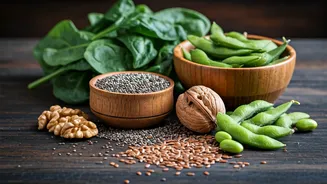Omega-3: The Essentials
Omega-3 fatty acids are indispensable for human health. These are essential fats, meaning our bodies can't produce them, so we must obtain them through
diet. They play a vital role in numerous bodily functions, particularly in supporting cardiovascular health. Incorporating omega-3s into your diet contributes to improved heart health, reduces inflammation, and enhances brain function. Understanding the importance of these fatty acids is the first step toward making informed dietary choices. Focusing on food sources is especially crucial for vegetarians, who must ensure adequate intake through plant-based options. By making omega-3 rich foods a consistent part of their meals, vegetarians can meet their daily needs and enjoy better overall health.
Flax Seeds: Tiny Giants
Flax seeds are a nutritional powerhouse, widely acclaimed for their impressive omega-3 content. They are a versatile addition to any diet and easy to incorporate into meals. The most effective way to consume flax seeds is ground, as this makes the nutrients more accessible to the body. Flaxseed can be sprinkled onto cereals, added to smoothies, or incorporated into baked goods, bringing a nutty flavor and a significant omega-3 boost. Furthermore, flax seeds are a good source of fiber, assisting in digestion and promoting a feeling of fullness. Regularly consuming flax seeds can positively affect heart health by lowering cholesterol levels and reducing blood pressure. They are also packed with antioxidants, which combat free radicals in the body, which helps in preventing cell damage and promoting overall health. As you begin adding flaxseeds to your diet, you are equipping your body with a powerful tool for wellness.
Chia Seeds: Superfood Status
Chia seeds, another nutritional giant, provide a significant amount of omega-3 fatty acids. They are a convenient and easy addition to various foods. Chia seeds can absorb large amounts of water, forming a gel-like consistency when soaked, which can be used to improve the texture of foods or provide a feeling of fullness. You can add them to puddings, use them as a thickening agent, or sprinkle them on salads and yogurt. They are also a great source of fiber, protein, and antioxidants, delivering a range of health benefits beyond their omega-3 content. Consuming chia seeds is associated with improved heart health, which include lowering bad cholesterol and reducing the risk of heart disease. Their high fiber content also helps in regulating blood sugar levels and promoting healthy digestion. By including chia seeds, you are contributing to a well-rounded diet that supports both physical health and energy levels.
Walnuts: Brain Boosters
Walnuts are a delicious and nutrient-rich food containing omega-3 fatty acids and often associated with brain health. They are a delightful snack, and a great addition to salads, or can be used as a topping on various dishes. Walnuts have a unique flavor and texture, which adds a pleasant dimension to your meals. These nuts offer a good source of antioxidants and healthy fats, further enhancing their nutritional profile. Regular consumption of walnuts is associated with cognitive benefits, which may include improved memory and focus. They also play a role in promoting heart health and managing cholesterol levels. Furthermore, the inclusion of walnuts in your diet ensures you are accessing essential nutrients that support long-term cognitive health. Making walnuts a part of your daily intake can contribute significantly to overall well-being and brain function.
Hemp Seeds: Versatile Choice
Hemp seeds stand out as a complete protein source, offering a full range of amino acids and omega-3 fatty acids. They have a subtle, nutty taste and can be incorporated into foods in many ways. Hemp seeds can be sprinkled on top of salads or added to smoothies, providing a nutritional boost to your meals. They also have a great texture and are easy to chew, and the versatility of these seeds also makes them ideal for various recipes. Besides their omega-3 content, hemp seeds are a good source of protein and fiber, promoting satiety and digestive health. They also supply essential minerals like magnesium and zinc, which play crucial roles in various bodily functions. Incorporating hemp seeds into your diet supports overall health and provides a source of vital nutrients. They are a good choice to enhance the nutritional value of your meals.
Edamame: Soybean Power
Edamame, or young soybeans, are a valuable source of omega-3 fatty acids. They offer a great combination of taste and nutritional value. The consumption of edamame is a great way to add nutrients to your diet, and they can be enjoyed as a snack or side dish. Edamame is a good source of plant-based protein, fiber, and various vitamins and minerals. The inclusion of edamame in your meals also adds a great source of omega-3s, which are essential for supporting heart health and reducing inflammation. Eating edamame supports not just cardiovascular health but also aids in overall well-being. By including these soybeans in your diet, you provide your body with multiple nutritional benefits, and help in creating a well-balanced dietary routine.
Seaweed: Ocean's Bounty
Seaweed, such as nori and kelp, is a natural source of omega-3 fatty acids. Seaweed also offers a unique flavor and texture to your dishes. Seaweed provides a great way to add crucial nutrients to your diet. The versatile nature of seaweed allows it to be used in salads, soups, or as a snack. Moreover, seaweed is rich in iodine, which plays a crucial role in thyroid function, and contains other minerals such as iron and magnesium. Regular consumption of seaweed can contribute to improved heart health, reduce the risk of certain cancers, and support overall wellness. By incorporating seaweed into your diet, you introduce a natural source of omega-3s and other beneficial nutrients. This not only enhances the nutritional profile of your meals but also supports your overall health.
Brussels Sprouts: Nutritional Powerhouse
Brussels sprouts, often overlooked, are a great source of omega-3 fatty acids, adding to their nutritional profile. These vegetables are versatile and can be prepared in many ways, such as roasted, steamed, or stir-fried. Brussels sprouts have a slightly bitter taste, which can be minimized by cooking them properly. They are also packed with vitamins, minerals, and fiber, contributing to digestive health. Consuming Brussels sprouts is associated with reduced inflammation, supporting the immune system, and improving overall health. By incorporating Brussels sprouts into your diet, you get a good source of omega-3s as well as other essential nutrients. This supports your heart health and provides a good balance for your diet. These cruciferous vegetables are a smart choice to improve your health.
Spinach: Leafy Goodness
Spinach is a leafy green vegetable that contains omega-3 fatty acids, and is a versatile addition to your diet. Spinach can be enjoyed in salads, smoothies, or cooked dishes. Spinach can also add a subtle flavor and texture to your meals. This leafy green is packed with vitamins, minerals, and antioxidants, and is great for your overall health. Regular consumption of spinach is associated with improved eye health, reduced inflammation, and better cardiovascular health. Incorporating spinach into your diet gives you a source of omega-3 fatty acids and other valuable nutrients. This supports heart health and adds a balance to your diet, making it a great choice to maintain overall wellness.
Cabbage: Heart Healthy Option
Cabbage is a nutritional powerhouse containing omega-3 fatty acids. Cabbage is also a versatile addition to your diet, and can be consumed in salads, slaws, or cooked dishes. Cabbage has a mild flavor and a crisp texture that can enhance various meals. Besides its omega-3 content, cabbage is rich in vitamin C, vitamin K, and fiber, contributing to immune function, blood clotting, and digestive health. Consuming cabbage is linked to improved heart health, reduced inflammation, and a lower risk of certain cancers. Including cabbage in your diet offers omega-3s and other beneficial nutrients. This supports cardiovascular health and adds balance to your meals. These cruciferous vegetables are a valuable addition to your dietary routine, promoting overall health and well-being.




















